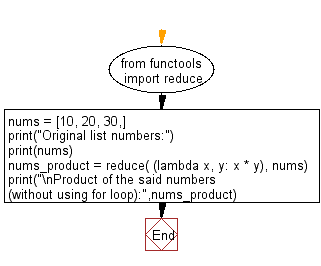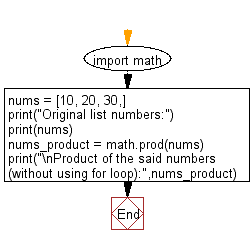Python: Product of list
List Product Calculator
Write a Python program to compute the product of a list of integers (without using a for loop).
Sample Solution-1:
Python Code:
# Import the 'reduce' function from the 'functools' module.
from functools import reduce
# Define a list named 'nums' containing a series of integers.
nums = [10, 20, 30]
# Print a message along with the original list of numbers.
print("Original list numbers:")
print(nums)
# Calculate the product of the numbers in the list 'nums' using the 'reduce' function
# and a lambda function that multiplies two numbers.
nums_product = reduce((lambda x, y: x * y), nums)
# Print the product of the numbers, obtained without using a for loop.
print("\nProduct of the said numbers (without using a for loop):", nums_product)
Sample Output:
Original list numbers: [10, 20, 30] Product of the numbers : 6000
Flowchart:

Sample Solution-2:
Python Code:
# Import the 'math' module to access the 'prod' function.
import math
# Define a list named 'nums' containing a series of integers.
nums = [10, 20, 30]
# Print a message indicating the original list of numbers.
print("Original list numbers:")
print(nums)
# Calculate the product of the numbers in the list 'nums' using the 'prod' function
# from the 'math' module.
nums_product = math.prod(nums)
# Print the product of the numbers, obtained without using a for loop.
print("\nProduct of the said numbers (without using a for loop):", nums_product)
Sample Output:
Original list numbers: [10, 20, 30] Product of the numbers : 6000
Flowchart:

For more Practice: Solve these Related Problems:
- Write a Python program to compute the product of all even numbers in a list.
- Write a Python program to compute the product of a list using recursion.
- Write a Python program to compute the sum and product of all elements in a dictionary.
- Write a Python program to find the factorial of a number using list product.
Go to:
Previous: Write a Python program to filter the positive numbers from a list.
Next: Write a Python program to print Unicode characters.
Python Code Editor:
What is the difficulty level of this exercise?
Test your Programming skills with w3resource's quiz.
